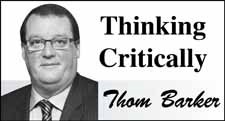Every generation has its own slang pertaining to things it finds generally positive. Some of those have been cool, hip, groovy, solid and swell. A few years ago that catchall term became 'awesome.'
Unlike some of its predecessors, awesome was a word that actually had a precise meaning, something that inspired an overwhelming feeling of reverence, admiration, or fear, like nature, the universe, or God.
Co-opting a word like 'cool' does not render in meaningless in its traditional sense. In the context of weather, it is still useful to indicate a moderately low temperature.
Sometimes in slang, a word is used ironically. For example, terrific originally meant causing terror. Applying a word to its opposite meaning has a long history in slang, such as 'bad' meaning 'good'. Ultimately, with terrific, the new usage became so common it led to a change in the dictionary definition.
Awesome, though, has simply been rendered meaningless. When you tell someone extraordinarily good news these days and they reply with "awesome," your achievement or good fortune is basically being equated with a new cat video on YouTube or a McDonald's cheeseburger.
I'm not going to get too bent out of shape about it. Language evolves. Maybe 'awesome' will make a comeback, but most likely it will just become another synonym for 'good.'
Unfortunately, though, it's getting harder and harder to find a way to describe something that is truly awe-inspiring. People try by adding a modifier such as 'totally' awesome or 'absolutely' awesome to distinguish it from the run-of-the-mill awesome of, say, finding the shirt you wanted on sale.
It's a wonder English ever became the de facto language of the world considering how chock full of ambiguous and multi-purposed words there are. It must be a nightmare for non-native speakers to learn.
It puts me in mind of the classic George Carlin "Have a Nice Day" comedy routine in which he refers to the words 'nice' and 'fine' as "soft and flabby."
"It's like 'fine'," he quips. "'How are ya?' 'Fine.' Bull***t! Nobody's 'fine'. Hair is fine. 'How's your hair?' 'Fine!'"
It also got me thinking about another things that something else that has become meaningless.
The standing ovation was once a rare event that indicated an audience's appreciation of an extraordinary (one might have said, awesome) performance.
Today, I can't remember the last time I attended a concert, play, sporting event, speech or public event of any kind where a standing 'O' was not forthcoming. It seems it has become the rule rather than the exception.
Honestly, the vast majority of events simply do not warrant it. And the amazing thing is, it doesn't take more than a handful of people to stand to get an entire venue on its feet. You can actually see this in action after a less than stellar show. A knot of people stand (perhaps the parents of the performers) and it spreads out from there, nobody, it seems, wanting to be impolite.
And it's not just audiences that have changed. When I first started going to concerts, bands would play all their hits and if they got a standing ovation and calls for an encore, which was not guaranteed, they would dig into their back catalogue for something to play.
Over the years though, as the ovation and calls for encores became de rigueur, bands started holding back their biggest songs, even shortening the duration of the main show, for the obligatory encore.
It doesn't look like this is going to change, so what do we do to replace the standing ovation to distinguish the remarkable from the mediocre? How do performers know if the audience truly loved them or were just being polite?
You can't even go backstage and personally tell them it was awesome anymore.




